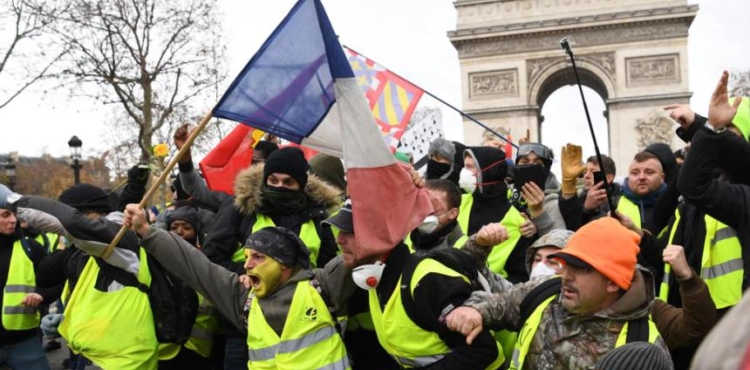French government spokesman Benjamin Grevo said he was taken to a safe place after unidentified men stormed the main door of his office with automatic weapons during protests in Paris.
"It´s not good to see people using heavy machine guns to break into a workplace," Griffo told the media.
"The attack is not about the person," he said, "but an attack on France and our institutions."
Later on Saturday, French President Emmanuel Macaron denounced what he called "excessive violence" during the yellow jacket protests on Saturday.
"Once again, he attacked the excessive republican violence - its guards, its representatives and its symbols," Macron wrote via Twitter.
He added: "justice will be achieved," adding: "Everyone must regain control of themselves for discussion and dialogue."
Tens of thousands of "yellow sweaters" demonstrated in France on Saturday in their eighth move, which was marked by clashes with security forces.
Eighty-five thousand people took part in the move, compared to 32,000 last week, Interior Minister Christophe Castaner said. The number of demonstrators was 65,000 at the end of the week before Christmas.
"This movement does not represent France," he said.
He condemned the clashes, which were recorded on Saturday with his approval that the majority of the demonstrations "took place in a good shape." But especially condemned attacks on the headquarters of municipalities and institutions and gendarmerie centers in addition to "journalists and newspapers."
After a quiet demonstration in the morning in Paris, clashes broke out in several neighborhoods in the afternoon, especially on the Seine Pier in the center of the capital. The number of participants in the afternoon was estimated at 4,000.
A fire broke out in a small restaurant near the Musée d´Orsay. Small motorbikes, a car and garbage containers were set on fire in the tourist district of St Germain, where obstacles were lifted, AFP correspondents reported.
"It is not possible to set fire in this way," one of the transports told Agence France-Presse, saying it "harms the image of France in the world."
Government spokesman Benjamin Grevo was evacuated from his office after a number of "yellow jackets" stormed the office of the prime minister.
"There were (yellow jackets) and people dressed in black (...) broke into the courtyard and smashed two cars," Grevo told AFP.
"I am not the target but the republic by people who want to topple the government, but the republic is steadfast," he said.
Several cities also witnessed clashes on the eighth mobilization day.
In Rawan (north-west), a demonstrator was injured, and the demonstrators then lifted up barriers and threw a gendarmerie barracks with shells, according to the city prosecutor.
"Demonstrators went to the Kayin police station in hostile buildings and threw projectiles at the security forces," police said in a statement. Several fires broke out, especially in front of the administrative center.
The "Yellow Jackets" movement was launched on November 17 and included Frenchmen from the poor and middle classes who denounced the government´s financial and social policies, which they considered unfair, and called for improved purchasing power in the country.
They did not care about the concessions made by President Emmanuel Macaron through the cancellation of an increase in fuel prices and measures to improve purchasing power, which cost the treasury 10 billion euros, in addition to announcing the start of a national debate in mid-January.
The cities of Bordeaux and Toulouse (southwest) have seen more mobilization than last Saturday. Some 4,600 "yellow jackets" in Bordeaux staged a sign saying "Change is possible if we unite." The demonstration did not pass without clashes with security forces.
Thousands of "yellow jackets" also closed the highway that passes through the city of Lyon in the east, causing heavy traffic, AFP correspondents said.
"We are here to change the system, we will stay here as long as nothing changes, there is no reason to go back to our homes," said student Walter, 23.












